American ginseng, known by its Latin name of Panax quinquefolius, is a slow-growing medicinal plant that produces a fleshy, white root and umbrella-shaped flowers which produce red berries.
For hundreds of years, ginseng has been a valuable medicinal plant to the indigenous Americans.
Ojibwe Midewiwin, spiritual leaders skilled in medicine, used the root for digestive troubles and pain relief. Muscogee people used a poultice of the root to staunch bleeding and a tea to treat respiratory conditions and fevers. The Meskwaki people of the Great Lakes region have used it as both an aphrodisiac and as a panacea, a universal remedy for children and adults. Ginseng was also highly prized by the Cherokee and was one of only a handful of plants taken with them on the Trail of Tears to what is now Oklahoma.
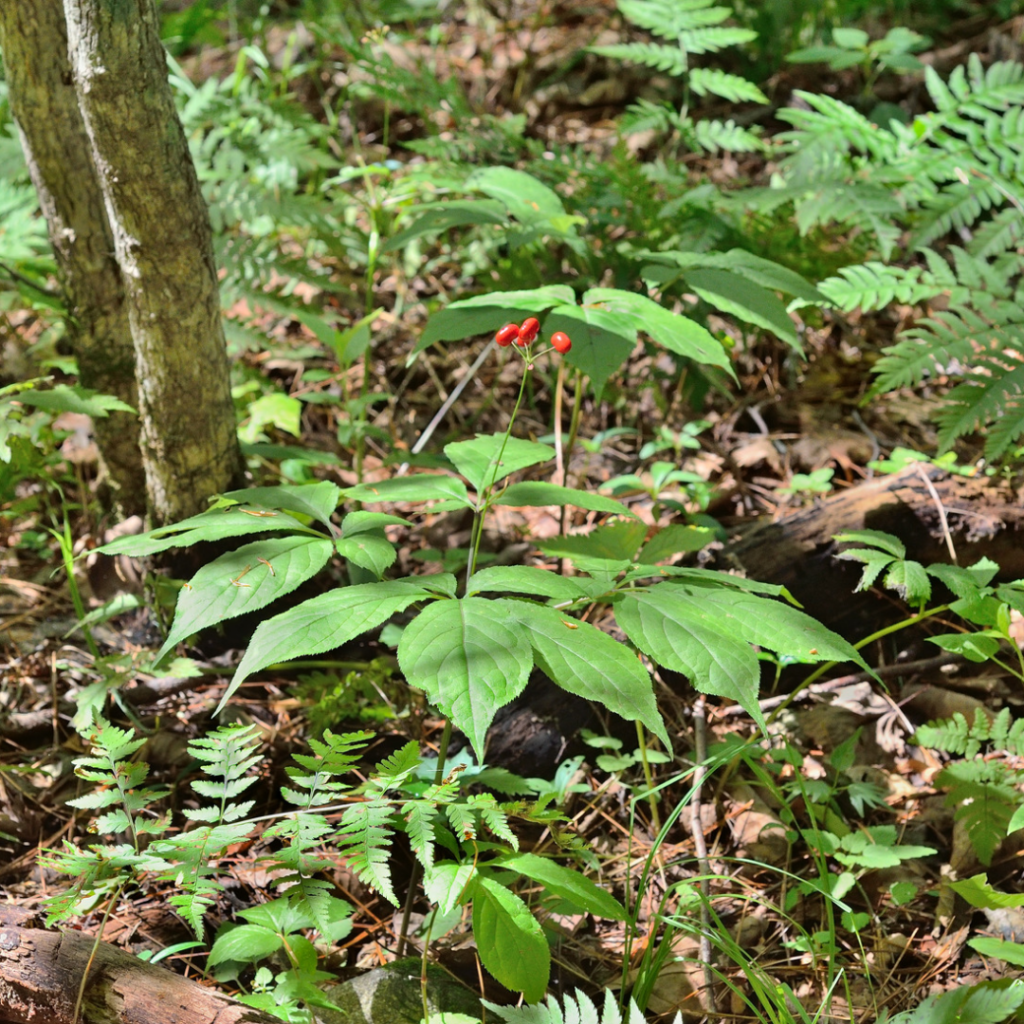
American vs Siberian Ginseng
American ginseng is slightly different than Asian or Korean ginseng (Latin name Panax ginseng) which is known to be more stimulating and can caused increased heart rate and blood pressure. American ginseng is better for promoting a calm, focused energy while improving stress response and overall brain function. However, both types of ginseng contain all of the same ginsenoside and gintonin compounds, just in different concentrations. American ginseng is often referred to as “white ginseng”while Asian ginseng is usually called “red ginseng”. Strangely, American ginseng is most prized in Asian and considered more valuable.
Overharvesting
Unfortunately ginseng’s popularity has lead to a dramatic decline in population over the years, especially in the Appalachian region. In many states it is illegal to wild harvest Ginseng. In the few states that it is legal, it is heavily regulated.
This is due to the slow germination and growth. Ginseng seeds take up to 18 months to germinate. Then it takes at least 5 to 8 years before the plant is fully mature.
In the Appalachians, ginseng hunting is a centuries-old tradition. In early globalization, ginseng became one of America’s first exports to the Far East. All through the 1700s, ginseng harvesting for the China trade was a feature of mountain life. Daniel Boone collected the plant along the Ohio river banks, and George Washington wrote in his diary of encountering ginseng traders hauling ginseng roots in Virginia’s mountains.
With no sustainable practices being respected, ginseng continued to be raped from the land until the early 1970s when it finally started to attract the attention of environmentalist.
With all this being said, the good news is that American ginseng can be cultivated! Fresh roots can be purchased online and transplanted in a desired locations for personal harvesting. This is a great option for those that want to enjoy the roots for years to come.
If you don’t have the space or don’t live in an area ginseng will grow, extracts, dried roots and root powder can be found online from several reputable companies.
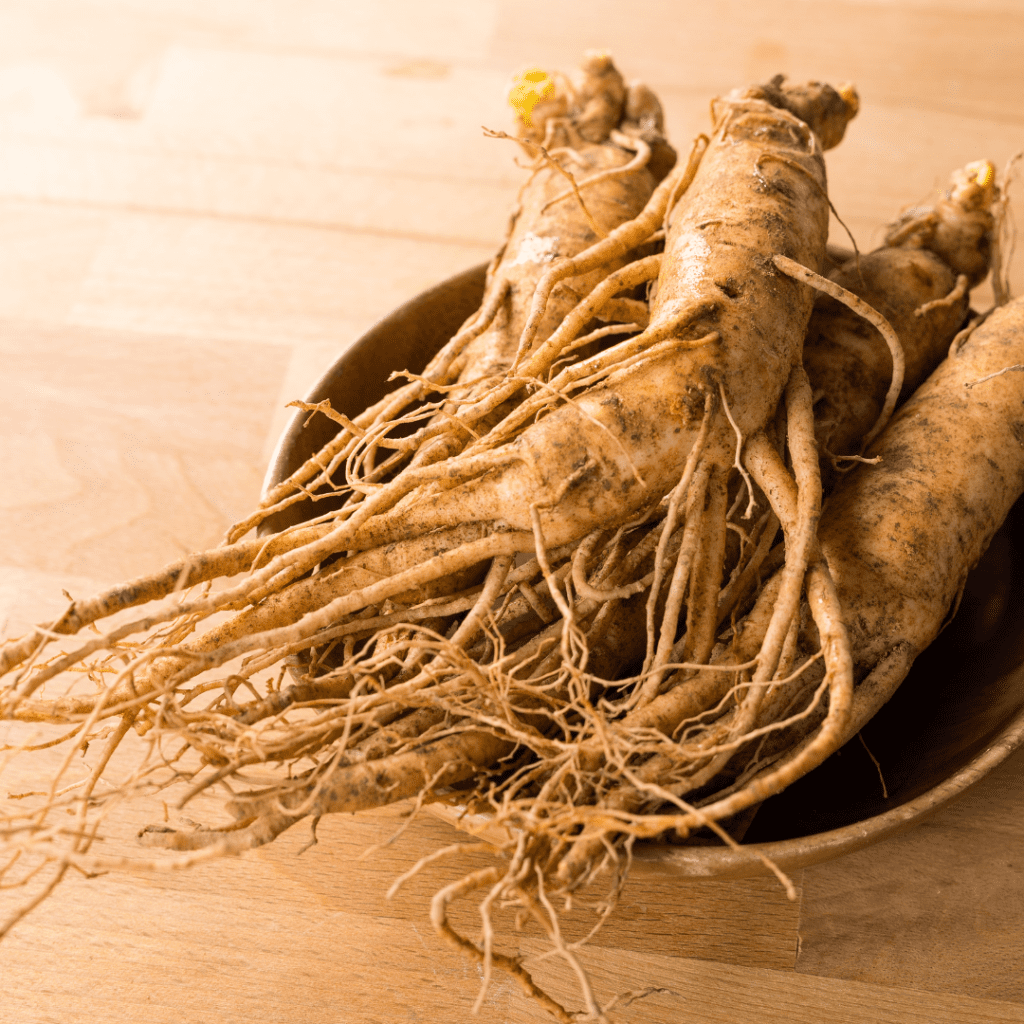
Medicinal benefits
American ginseng is thought to cool and nourish the body’s Qi energy as well as improve physical strength, promote health and increase longevity. To date, several studies have confirmed the power behind ginseng’s powerful potency.
Adaptogenic: American ginseng is considered an adaptogen herb. Adaptogens are herbs that help the body overcome the influences of physical, chemical, or biological stressors. In simpler terms they help your body adapt to stress.
Adaptogens are also said to have anti-aging properties and have been used for hundreds of years in Ayurvedic healing practices. Adaptogens are recommended by holistic practitioners to:
• Improve attention
• Increase endurance in situations caused by fatigue
• Lower stress-induced disorders and impairments in the body
• Balance hormone levels
• Keep cortisol (the stress hormone) levels and other hormone levels in check
• Fight fatigue that results from excessive physical or emotional stress
• Combat the impact that stress has on cognitive function
•Stimulate mental performance that has been impacted by stress
• Normalize body functions
• Boost the immune system
• Fight the symptoms caused by elevated cortisol levels (such as anxiety, depression, fatigue, high blood pressure, insulin resistance, and obesity)
• Increase physical stamina and improve energy levels
• Improve the function of organs, such as the liver and adrenal glands
• Improve the function of body systems, such as the gastrointestinal system
Fatigue: Ginseng increases energy and decreases fatigue due to lowering oxidative stress levels, and increasing energy production in cells. A review of four studies suggests American ginseng may benefit adults with fatigue due to chronic illness. The most significant benefit was seen in participants who took 2,000 milligrams (mg) of American ginseng daily for eight weeks.
Another systematic review on cancer-related fatigue rated American ginseng as likely effective for adult cancer patients. The benefit was greatest in people undergoing active treatment, like chemotherapy or radiation. American ginseng did not interact with common chemotherapy medications such as tamoxifen, doxorubicin, methotrexate, or fluorouracil.
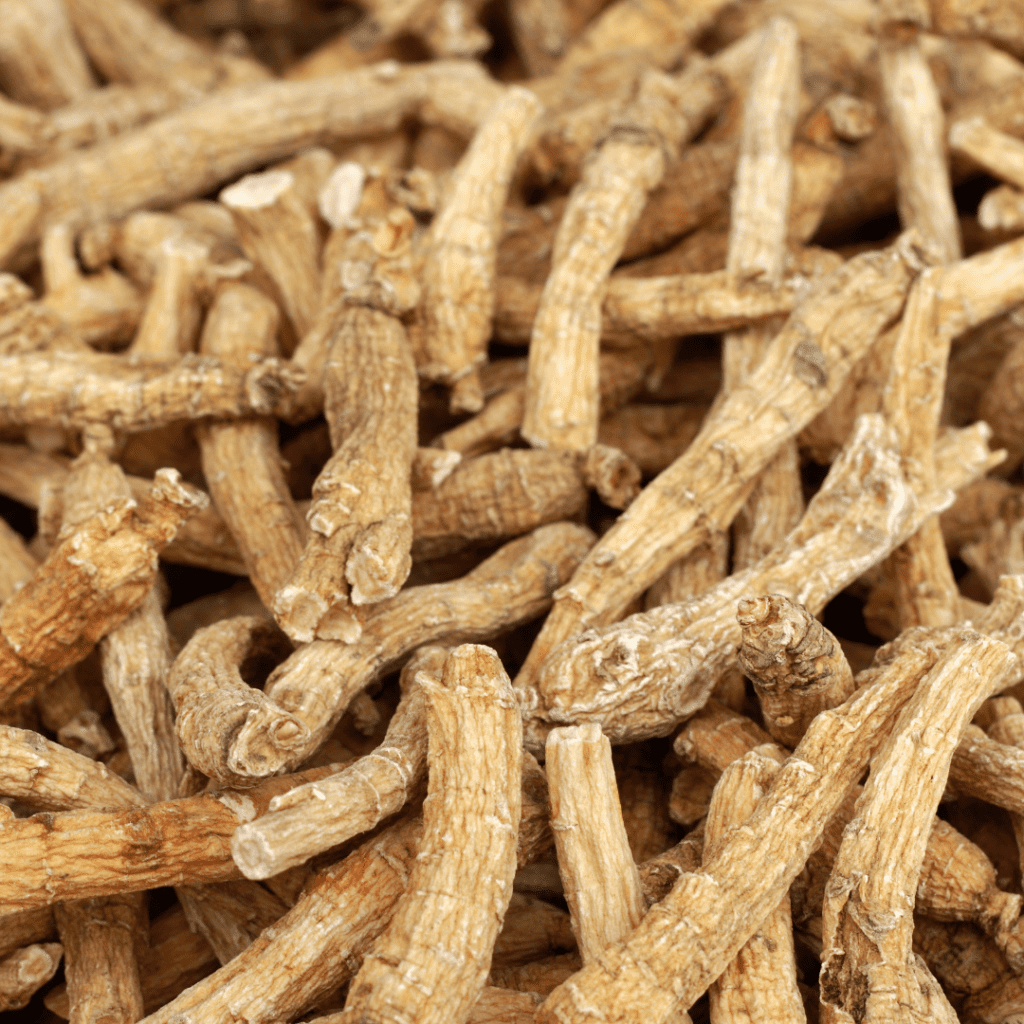
Mental Function: A 2015 study showed increased working memory in healthy middle-aged adults who received a single 200 mg dose of a standardized American ginseng extract called Cereboost. The biggest improvement in cognitive function was seen three hours after Cereboost was taken.
A study of 61 healthy younger adults showed improved working memory and attention after taking 200 mg of Cereboost. These effects were enhanced when Cereboost was taken daily for two weeks. Scientists believe American ginseng may improve mood and cognitive function by altering the gut microbiome.
Diabetes: A review of 16 ginseng trials (three of which studied American ginseng) concluded that fasting blood sugar was modestly lowered by taking ginseng. A small study of 24 people with type 2 diabetes showed that taking 3,000 mg of American ginseng daily could help with blood sugar control. At the end of eight weeks, the people who used American ginseng had decreased hemoglobin A1C levels, fasting blood sugar, and systolic blood pressure compared to those who took a placebo.
Cold & Flu: According to a 2017 review, American ginseng offered protection against viral respiratory tract infections, including influenza and the common cold. This was based on a study that showed a decreased risk and duration of cold and flu symptoms in older adults with weakened immune systems who took an American ginseng extract called COLD-FX.
Cancer: American ginseng is often prescribed for cancer patients due to its possible anti-cancer properties and support of immune system function. A study of 905 cancer cases and 905 controls conducted in Korea suggested that ginseng intake significantly reduced cancer incidence (odds ratio [OR], 0.56; 95% CI, 0.45-0.69), with greater efficacy seen with ginseng extract and powder compared with fresh slices, juice, or tea.
Although this study was performed using siberian ginseng, it is believed the American variety would show similar findings.
Medical reference guide published by the University of Maryland Medical Center states that American ginseng stabilizes blood sugar in diabetics, inhibits cancer growth, prevents and fights colds, and enhances cognition.
This report even suggests ginseng can be used to treat ADHD without the use of drugs with more side effects or potential for addiction such as Adderall or Ritalin.
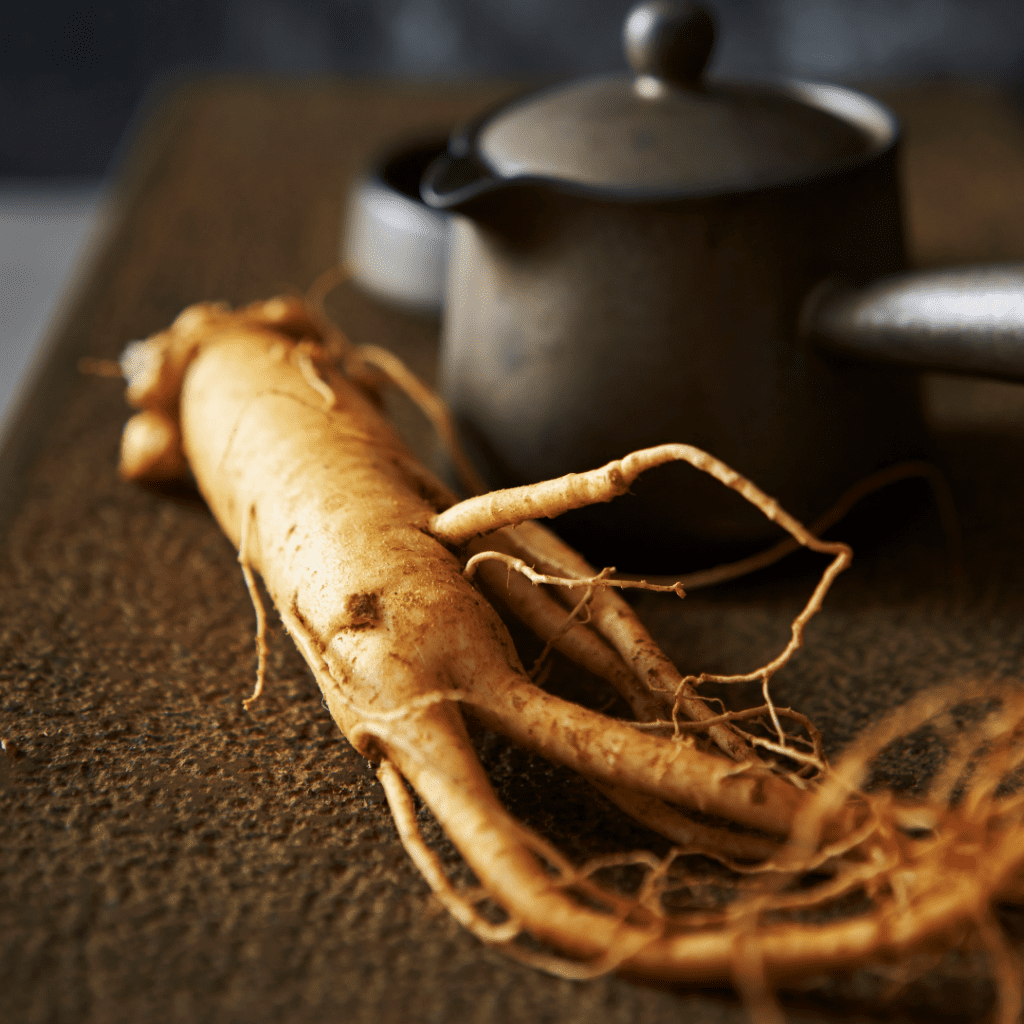
How to use
The compounds responsible for the health benefits in ginseng are known as gintonin and ginsenosides. Gintonin is made of complexes of lysophosphatidic acid (LPA) such as protein 151 (GLP151). Ginsenosides constitute over 30 different compounds.
These compounds are found in high concentrations within the leaves and root of the plant. They are best consumed by taking a liquid extract instead of solid pills or capsules so that they can be quickly absorbed by the digestive system. Research shows liquid supplements are absorbed at almost twice the rate when compared to solid capsules. Therefore, your best bet at gaing the fullest potential from ginseng is to make or take a tincture.
Tincture: Tinctures are liquid extractions of the medicinal properties of plants infused into alcohol. They are easy to make, efficient and effective. If you have never made a tixture before follow our step-by-step guide on the process.
Because ginseng is slow growing and is considered an endangered species in some states due to high demand, it’s recommended not to harvest from the wild. However, roots and root powder, as well as extracts can be purchased online. Dried roots work well for making tinctures.
Don’t want the trouble? Purchase our American Ginseng Elixir made from our cultivated Appalachian Ginseng here.
Tea: Another great option is using powder or whole roots to brew tea to get the same benefits of fast absorption.
Add 1 – 2 teaspoons of dried root to a mug. Add 1 cup boiling water and steep 10-15 minutes. Strain out your roots and enjoy!
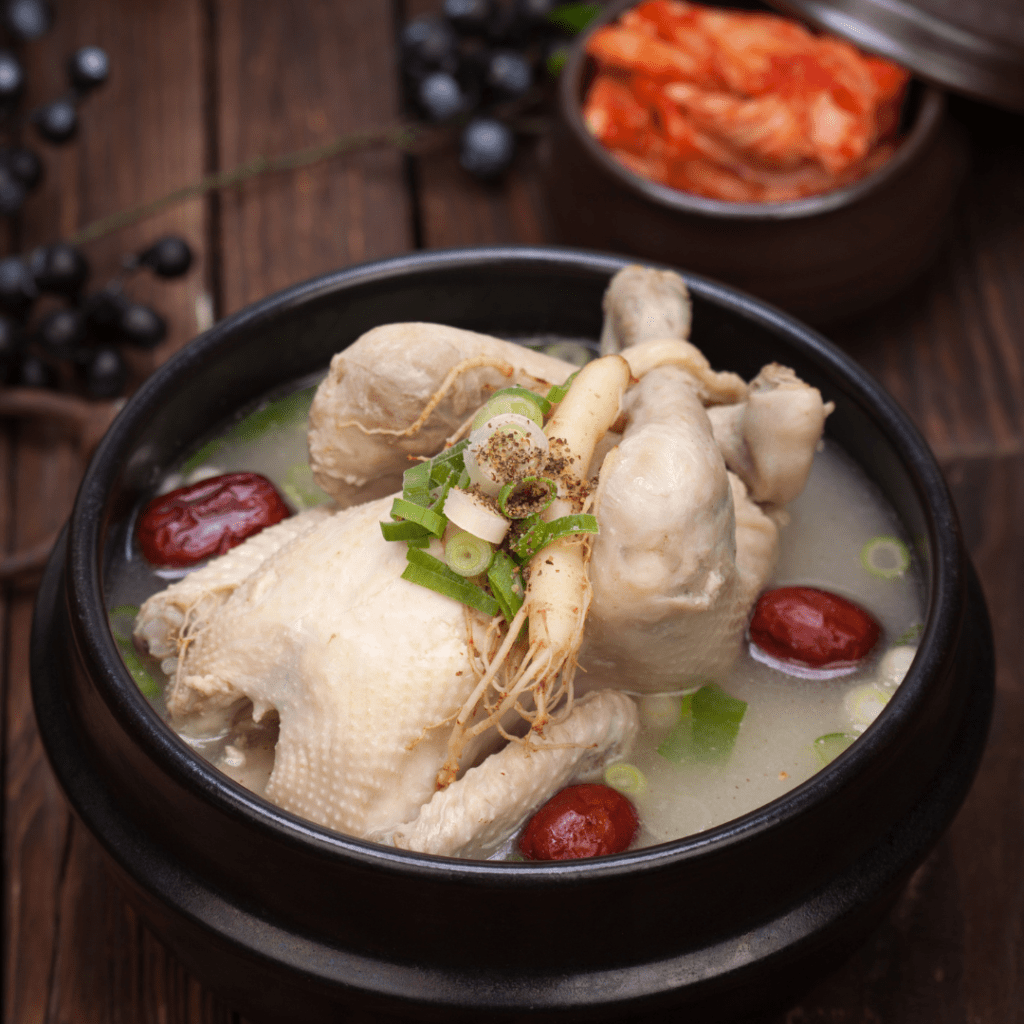
Culinary: For centuries, Asian cultures have made ginsing chicken soup (Samgyetang) a wonderful traditional dish packed full of health benefits. Ginseng offers an earthy, bitter, cleansing flavor that complements meats and vegetables beautifully. Use in your culinary creations as you please!
Safety Considerations
The long-term side effects of ginseng use aren’t known. Some groups of people should take special precautions when using American ginseng and may need to avoid it altogether. The following conditions make taking American ginseng riskier:
Pregnancy: American ginseng is related to Panax ginseng, which is linked to possible birth defects.
Breastfeeding: There is insufficient data to determine if taking American ginseng while nursing is safe.
Estrogen-sensitive conditions: Conditions like breast cancer, uterine cancer, ovarian cancer, endometriosis, or uterine fibroids could be exacerbated (worsened) because ginsenosides in American ginseng may act like estrogen.
Insomnia: High doses of American ginseng may cause difficulty sleeping.
Schizophrenia: High doses of American ginseng can increase agitation in people with schizophrenia.
Autoimmune disorders: American ginseng may have effects on the immune system.
Surgery: American ginseng should be stopped two weeks before surgery due to its impact on blood sugar.
American ginseng has been studied at the following dosages: Adults: 200 to 400 mg by mouth twice daily for three to six months.
Interactions: American ginseng may interact with prescription and OTC medications and supplements. Unless your healthcare provider has advised it, don’t take American ginseng with prescription medications such as:
Jantoven (warfarin): American ginseng may reduce the drug’s effectiveness and increase blood clotting.
Antidepressants: monoamine oxidase inhibitors (MAOIs), such as Zelapar (selegiline)and Parnate (tranylcypromine): The combination may cause anxiety, restlessness, manic episodes, or trouble sleeping.
Diabetes medications: Hypoglycemia (low blood sugar) may occur.
Progestins (hormones commonly found in birth control pills): Side effects could be increased since American ginseng has estrogen-like effects.
Other herbal supplements that lower blood sugar may also interact with American ginseng, potentially causing hypoglycemia. Talk to your doctor about any medication you’re taking or if you’re pregnant or nursing before you begin any herbal therapies at all.
It is recommended by most herbalists not to use american ginseng ongoing for longer than six months. Herbal medicine is still medicine and must be used in moderation. View our disclaimer here.

Final thought
In the end, ginseng has been used for hundreds, if not thousands of years for good reason. It’s healing potential is still shocking scientists as it continues to prove what humans have believed for so long.
Experience the amazing potential American ginseng has to offer in our American Adaptogen Pure Ginseng Elixir.
Stay Wild
Sources below
https://www.ncbi.nlm.nih.gov/pmc/articles/PMC6567205/
Anti-Fatigue Effects of Small Molecule Oligopeptides Isolated from Panax ginseng C. A. Meyer in Mice.
Effects of American ginseng (Panax quinquefolius) on neurocognitive function: an acute, randomised, double-blind, placebo-controlled, crossover study
Protective effects of Panax ginseng on muscle injury and inflammation after eccentric exercise
The Effect of Ginseng (The Genus Panax) on Glycemic Control: A Systematic Review and Meta-Analysis of Randomized Controlled Clinical Trials

Kayce Heister
Kayce is a Clinical Herbalist, Naturopathic Practitioner (HHP), Active Forager, Wild Food Chef and Mother of three. She has spent the last 20 years practicing herbalism and natural health, and spends most of her time educating others on the amazing potential the natural world can offer.